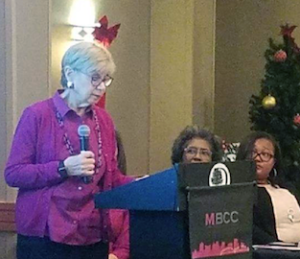The Memphis Breast Cancer Consortium (MBCC) on Thursday released some alarming statistics for African-American women and breast cancer mortality rates in Memphis and Shelby County.
The Common Table Health Alliance (CTHA), a 31-member, non-profit health services coalition, rolled out the MBCC in 2016 after a study asserted that “black women were dying of breast cancer at more than double the rate of white women.” Also, Memphis had the greatest disparity among the 50 largest U.S. cities. A whopping 68.9 percent of African-American women were more likely to die from a breast-cancer diagnosis.
Findings of “The Breast Cancer 901 Community Report” released at the Double Tree Hotel Memphis event revealed that despite two years of working to eliminate the glaring disparity of breast cancer mortality “between white women and black women” in the Memphis-metropolitan area, African-American women are still nearly 40 percent more likely to die.
The culprit? Poverty and its effects, according to the report’s data.
“Black women are 40 percent less likely to receive an annual mammogram among those in the recommended age range of 40-64. This factor bears a direct correlation between annual mammograms with early detection and survival rates.
The MBCC report clearly links economic adversity with higher breast cancer mortality rates. Each Shelby County ZIP code was mapped out in an “Economic Hardship Index,” gauging unemployment numbers, income level, crowded housing conditions, and related factors. Areas that scored high in economic hardship, such as North and South Memphis communities, generally logged higher cancer mortality rates than other areas in Shelby County.
In real numbers, 210,870 Shelby County women are in the 40-64, according to the report. But 84,348 of those women — or 40 percent — are not receiving their yearly screenings.
Shelby County has enough resources for every woman to get a yearly mammogram, but tens of thousands still don’t, the report determined.

More than 200,000 screening mammograms could be performed annually at Memphis and Shelby County’s 23 facilities. Facility quality is not an issue. Seventeen of those facilities, according to a survey conducted for the report, show they are of “an exceptional quality,” according to MBCC Project Director Carla Baker.
“Our local facilities have the proper accreditation, and wait times are not far off from the national average,” said Baker.
“Helping to address the concerns of women who aren’t getting mammograms could significantly reduce racial disparity and possible barriers in receiving mammograms,” Baker said. “Mammograms can detect breast cancer early and lead to early treatment, a key factor in reducing the mortality rate.”

The report is encouraging, however, according to Kiki Hall, CEO of CTHA, because it eliminates accessibility as a barrier. Every woman who needs a mammogram may get one, despite income and health insurance concerns.
“Our findings are significant because it shows MBCC and our local health facilities what we are doing well and where we need to improve,” said Hall.
“What we need is a plan of action to eliminate the factors that prevent women from getting their annual breast cancer exams. All women in Memphis and Shelby County may get a mammogram. We have to understand what their real issues are if we are going to eliminate disparity.”

Margaret Hartig, MBCC principal investigator, concurred, citing “a myriad of reasons” why African-American women are not getting annual mammogram screenings. Among the reasons are a lack of transportation, time constraints, no health insurance, and a high level of discomfort with the procedure.”
Facilities, she said, are working on reducing that level of discomfort.
According to the Sister Network Inc., an organization focused on the study and support of African-American women with breast cancer, “the median age of diagnosis is 58 for black women, compared to 62 for white women.”
Reduce the risk
All women can reduce their risk of breast cancer, according to the American Cancer Society, by:
- Avoiding weight gain and obesity
- Engaging in regular exercise and physical activity
- Minimizing alcohol intake
- Minimizing estrogen and progestin hormone therapy in treating menopausal symptoms
- Being a non-smoking
Mammogram screening
Women in Memphis and Shelby County who would like to receive a mammogram screening may contact the Shelby County Health Department at: 901-222-9000.
For more information:
- Common Table Health Alliance at 901-681-6011.
- Visit https://www.mbcc.live/.
- Visit http://commontablehealth.org/.




